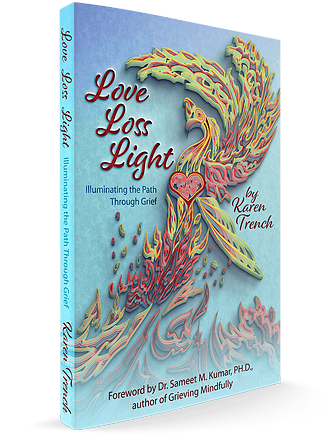Posted by Rachel Iacino on Jul 27, 2021 in Personal Development & Communication
The Societal Stigma Surrounding Death
By Karen Trench

Karen Trench
Award-Winning Author, Love Loss Light-Illuminating the Path Through Grief and CFU Instructor
Karen has been a successful cable television executive, editor, and franchise broker. Today she is a grief and loss life coach, and award winning author, guiding people towards peace and resolution.
She now offers a new class at Colorado Free University designed for people experiencing grief: Embracing Life Beyond Loss.
Embracing Life Beyond Loss
I made a vow to myself soon after losing my beloved husband to suicide that I would always be truthful whenever I was asked how he had died. And, to this day, six years later, I have upheld that vow. After all, it’s my truth. But admitting that he took his own life has made for some very uncomfortable and awkward moments—not so much for me, but for the person who asked.
When I made that vow, I was painfully aware of the stigma that surrounds suicide, and sadly, suicide survivors. But what I have come to learn is that there is a societal stigma surrounding death in general. When someone we know has died, it reminds us of our own mortality. We become uncomfortable because their death is a reminder that our own death and the death of our loved ones is imminent, and we can’t bear the thought of either occurrence. We’re terrified to look death square in the face until the death of a close friend or family member holds a mirror up to us and forces us to take a good look. And, unlike many other cultures, in our society, people don’t openly discuss death.
All of this can lead to some pretty awkward behavior when we find ourselves in the presence of someone who has lost a loved one. We may say something perfectly acceptable but trite or inadequate such as, “I’m so sorry for your loss.” Or we say something completely inappropriate—or worse, we avert our gaze all together and remain speechless, acting as though nothing has happened. Two days after my husband died, a well-intentioned girlfriend called me and actually asked me out to lunch! I could barely move from my chair because the weight of my grief was so heavy that the mere idea of meeting a girlfriend for lunch seemed not only ludicrous, but insulting.
In Times of Bereavement

In time of bereavement people’s words or deeds can either make us feel extremely comforted or can unintentionally hurt us. And if someone unintentionally hurts us or if we feel slighted in some way, instead of feeling angry, disappointed, or disrespected, we should try to show them a measure of compassion and mercy. After all, who among us has not been on the giving end of extending condolences? And who among us hasn’t felt somewhat awkward or at a loss for just the right words during those challenging times?
Forgiving ourselves our own possible trespasses allows us to be more forgiving of those who may unintentionally trespass against us during our time of loss. Each of us in only human after all, complete with fears, foibles, and insecurities that can manifest at times in the worst possible ways—but most especially under the specter of death.
Join Karen in Class
If you would like to join Karen for the next in-person class, Embracing Life Beyond Loss, please call CFU on 303 399 0093 Ext (0) or visit us on the web – www.freeu.com.
More from Karen on her Writing Process
My quest for relief became a spiritual quest, and it began with reading over forty books (within the first five months) on grief and loss and on mindfulness practice. Every book I read gave me solace and comfort, knowing that I was not alone and that most of us, sooner or later, will need to fill the void left behind when someone we love dies.
During this time, early on in my healing, I came to a knowing that at some point along the way, when I was stronger, I wanted to pay it forward; to find some way to help others on their unique, individual journey through grief and loss. I just wasn’t sure how that might manifest. It was about a year and a half after my loss, that my therapist asked “the question” that would align me with my goal. “What are your God-given gifts?” To which I automatically replied, “Writing.” That was that. In that moment, I KNEW that I was meant to write my story and that’s what I did. I spent the next year and a half writing my now award-winning book: Love Loss Light-Illuminating the Path Through Grief. Truth be told, the words tumbled forth onto the page; I was a woman driven by purpose!
